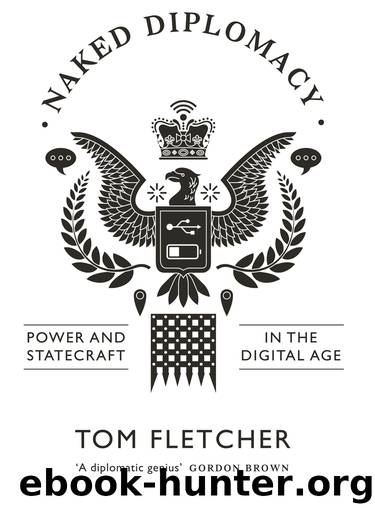Naked Diplomacy by Tom Fletcher

Author:Tom Fletcher
Language: eng
Format: epub
Publisher: HarperCollins Publishers
Published: 2016-04-28T16:00:00+00:00
New technology is an extraordinary opportunity to jump-start the connection between the public and public servants.
Increasingly, those in political life will have to use people’s desire for connectivity rather than push against it – I now encourage people to fiddle with their phones when I am giving a speech rather than ask them to put them away. People want to play their part in finding solutions to problems, and technology makes that easier.
Content is now king. And good diplomats have never shied away from producing quality content themselves. Normally in the form of a diplomatic telegram, this was traditionally read by a handful of fellow diplomats. A recent UK Foreign Office innovation measured how many – or as it turned out to our disappointment, how few – colleagues read our internal reports. Now social media gives a means to amplify decent content at a much more influential scale. There should be no set rules on how we do this – individuals need to find their own tempo and their own voice. Governments have to recruit and empower digital natives to whom it comes naturally; and train and equip the rest of us.
New technology can even help us to crowdsource diplomacy, the ultimate in connectivity. Crowdfunding generated over $2.6 billion in 2012,6 more than the budget of most foreign ministries. But the finance matters less than the possibility of making policy decisions more democratic and accountable. To at last empower the mob. Now that is a game changer – chaotic maybe, but as I’ll argue later, the more that policymaking, including foreign policy, has been democratised, the better it has become.
Anyone seeking to connect with people and build influence using new digital tools needs to be authentic, engaging and purposeful. All three. Because authenticity and engagement without purpose equals eye-catching but meaningless stunts and slogans. You can get people’s attention, but they won’t necessarily listen to what you have to say afterwards. Much cute-cat social media does not need to be purposeful (and it would be a killjoy who suggests that it does), but a government’s social media presence needs to add up to something more than follower numbers or Facebook likes.
I worry that an increasing amount of hashtag diplomacy falls into that category. It is a great way to get attention for an issue or campaign, but social media has to be a way of marshalling action, not a replacement for it. I’ve become increasingly frustrated by online campaigns showing solidarity for countries in conflict. They are wonderful in many ways, and the cause could not be more important, but I don’t want people just to like a site or watch a YouTube video. I want them to be moved by their anger to actually do something, to contribute financially to a charity on the front line of the humanitarian response, or to lobby their government. We must avoid an era of armchair activism. As Chloe Dalton, a former special adviser to William Hague, puts it, ‘No one has ever been saved by a hashtag.
Download
This site does not store any files on its server. We only index and link to content provided by other sites. Please contact the content providers to delete copyright contents if any and email us, we'll remove relevant links or contents immediately.
| Arms Control | Diplomacy |
| Security | Trades & Tariffs |
| Treaties | African |
| Asian | Australian & Oceanian |
| Canadian | Caribbean & Latin American |
| European | Middle Eastern |
| Russian & Former Soviet Union |
The Secret History by Donna Tartt(19085)
The Social Justice Warrior Handbook by Lisa De Pasquale(12190)
Thirteen Reasons Why by Jay Asher(8909)
This Is How You Lose Her by Junot Diaz(6885)
Weapons of Math Destruction by Cathy O'Neil(6279)
Zero to One by Peter Thiel(5801)
Beartown by Fredrik Backman(5752)
The Myth of the Strong Leader by Archie Brown(5507)
The Fire Next Time by James Baldwin(5442)
How Democracies Die by Steven Levitsky & Daniel Ziblatt(5218)
Promise Me, Dad by Joe Biden(5153)
Stone's Rules by Roger Stone(5087)
A Higher Loyalty: Truth, Lies, and Leadership by James Comey(4960)
100 Deadly Skills by Clint Emerson(4924)
Rise and Kill First by Ronen Bergman(4788)
Secrecy World by Jake Bernstein(4752)
The David Icke Guide to the Global Conspiracy (and how to end it) by David Icke(4717)
The Farm by Tom Rob Smith(4507)
The Doomsday Machine by Daniel Ellsberg(4490)
